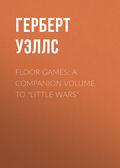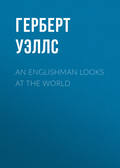
Герберт Джордж Уэллс
Mr. Britling Sees It Through
§ 8
"Life had a wrangling birth. On the head of every one of us rests the ancestral curse of fifty million murders."
So Mr. Britling's thoughts shaped themselves in words as he prowled one night in March, chill and melancholy, across a rushy meadow under an overcast sky. The death squeal of some little beast caught suddenly in a distant copse had set loose this train of thought. "Life struggling under a birth curse?" he thought. "How nearly I come back at times to the Christian theology!.. And then, Redemption by the shedding of blood."
"Life, like a rebellious child, struggling out of the control of the hate which made it what it is."
But that was Mr. Britling's idea of Gnosticism, not of orthodox Christianity. He went off for a time into faded reminiscences of theological reading. What had been the Gnostic idea? That the God of the Old Testament was the Devil of the New? But that had been the idea of the Manichæans!..
Mr. Britling, between the black hedges, came back presently from his attempts to recall his youthful inquiries into man's ancient speculations, to the enduring riddles that have outlasted a thousand speculations. Has hate been necessary, and is it still necessary, and will it always be necessary? Is all life a war forever? The rabbit is nimble, lives keenly, is prevented from degenerating into a diseased crawling eater of herbs by the incessant ferret. Without the ferret of war, what would life become?.. War is murder truly, but is not Peace decay?
It was during these prowling nights in the first winter of the war that Mr. Britling planned a new writing that was to go whole abysses beneath the facile superficiality of "And Now War Ends." It was to be called the "Anatomy of Hate." It was to deal very faithfully with the function of hate as a corrective to inefficiency. So long as men were slack, men must be fierce. This conviction pressed upon him…
In spite of his detestation of war Mr. Britling found it impossible to maintain that any sort of peace state was better than a state of war. If wars produced destructions and cruelties, peace could produce indolence, perversity, greedy accumulation and selfish indulgences. War is discipline for evil, but peace may be relaxation from good. The poor man may be as wretched in peace time as in war time. The gathering forces of an evil peace, the malignity and waste of war, are but obverse and reverse of the medal of ill-adjusted human relationships. Was there no Greater Peace possible; not a mere recuperative pause in killing and destruction, but a phase of noble and creative living, a phase of building, of discovery, of beauty and research? He remembered, as one remembers the dead, dreams he had once dreamt of the great cities, the splendid freedoms, of a coming age, of marvellous enlargements of human faculty, of a coming science that would be light and of art that could be power…
But would that former peace have ever risen to that?..
After all, had such visions ever been more than idle dreams? Had the war done more than unmask reality?..
He came to a gate and leant over it.
The darkness drizzled about him; he turned up his collar and watched the dim shapes of trees and hedges gather out of the night to meet the dismal dawn. He was cold and hungry and weary.
He may have drowsed; at least he had a vision, very real and plain, a vision very different from any dream of Utopia.
It seemed to him that suddenly a mine burst under a great ship at sea, that men shouted and women sobbed and cowered, and flares played upon the rain-pitted black waves; and then the picture changed and showed a battle upon land, and searchlights were flickering through the rain and shells flashed luridly, and men darkly seen in silhouette against red flames ran with fixed bayonets and slipped and floundered over the mud, and at last, shouting thinly through the wind, leapt down into the enemy trenches…
And then he was alone again staring over a wet black field towards a dim crest of shapeless trees.
§ 9
Abruptly and shockingly, this malignity of warfare, which had been so far only a festering cluster of reports and stories and rumours and suspicions, stretched out its arm into Essex and struck a barb of grotesque cruelty into the very heart of Mr. Britling. Late one afternoon came a telegram from Filmington-on-Sea, where Aunt Wilshire had been recovering her temper in a boarding-house after a round of visits in Yorkshire and the moorlands. And she had been "very seriously injured" by an overnight German air raid. It was a raid that had not been even mentioned in the morning's papers. She had asked to see him.
It was, ran the compressed telegraphic phrase, "advisable to come at once."
Mrs. Britling helped him pack a bag, and came with him to the station in order to drive the car back to the Dower House; for the gardener's boy who had hitherto attended to these small duties had now gone off as an unskilled labourer to some munition works at Chelmsford. Mr. Britling sat in the slow train that carried him across country to the junction for Filmington, and failed altogether to realise what had happened to the old lady. He had an absurd feeling that it was characteristic of her to intervene in affairs in this manner. She had always been so tough and unbent an old lady that until he saw her he could not imagine her as being really seriously and pitifully hurt…
But he found her in the hospital very much hurt indeed. She had been smashed in some complicated manner that left the upper part of her body intact, and lying slantingly upon pillows. Over the horror of bandaged broken limbs and tormented flesh below sheets and a counterpane were drawn. Morphia had been injected, he understood, to save her from pain, but presently it might be necessary for her to suffer. She lay up in her bed with an effect of being enthroned, very white and still, her strong profile with its big nose and her straggling hair and a certain dignity gave her the appearance of some very important, very old man, of an aged pope for instance, rather than of an old woman. She had made no remark after they had set her and dressed her and put her to bed except "send for Hughie Britling, The Dower House, Matching's Easy. He is the best of the bunch." She had repeated the address and this commendation firmly over and over again, in large print as it were, even after they had assured her that a telegram had been despatched.
In the night, they said, she had talked of him.
He was not sure at first that she knew of his presence.
"Here I am, Aunt Wilshire," he said.
She gave no sign.
"Your nephew Hugh."
"Mean and preposterous," she said very distinctly.
But she was not thinking of Mr. Britling. She was talking of something else.
She was saying: "It should not have been known I was here. There are spies everywhere. Everywhere. There is a spy now – or a lump very like a spy. They pretend it is a hot-water bottle. Pretext… Oh, yes! I admit – absurd. But I have been pursued by spies. Endless spies. Endless, endless spies. Their devices are almost incredible… He has never forgiven me…
"All this on account of a carpet. A palace carpet. Over which I had no control. I spoke my mind. He knew I knew of it. I never concealed it. So I was hunted. For years he had meditated revenge. Now he has it. But at what a cost! And they call him Emperor. Emperor!
"His arm is withered; his son – imbecile. He will die – without dignity…"
Her voice weakened, but it was evident she wanted to say something more.
"I'm here," said Mr. Britling. "Your nephew Hughie."
She listened.
"Can you understand me?" he asked.
She became suddenly an earnest, tender human being. "My dear!" she said, and seemed to search for something in her mind and failed to find it.
"You have always understood me," she tried.
"You have always been a good boy to me, Hughie," she said, rather vacantly, and added after some moments of still reflection, "au fond."
After that she was silent for some minutes, and took no notice of his whispers.
Then she recollected what had been in her mind. She put out a hand that sought for Mr. Britling's sleeve.
"Hughie!"
"I'm here, Auntie," said Mr. Britling. "I'm here."
"Don't let him get at your Hughie… Too good for it, dear. Oh! much – much too good… People let these wars and excitements run away with them… They put too much into them… They aren't – they aren't worth it. Don't let him get at your Hughie."
"No!"
"You understand me, Hughie?"
"Perfectly, Auntie."
"Then don't forget it. Ever."
She had said what she wanted to say. She had made her testament. She closed her eyes. He was amazed to find this grotesque old creature had suddenly become beautiful, in that silvery vein of beauty one sometimes finds in very old men. She was exalted as great artists will sometimes exalt the portraits of the aged. He was moved to kiss her forehead.
There came a little tug at his sleeve.
"I think that is enough," said the nurse, who had stood forgotten at his elbow.
"But I can come again?"
"Perhaps."
She indicated departure by a movement of her hand.
§ 10
The next day Aunt Wilshire was unconscious of her visitor.
They had altered her position so that she lay now horizontally, staring inflexibly at the ceiling and muttering queer old disconnected things.
The Windsor Castle carpet story was still running through her mind, but mixed up with it now were scraps of the current newspaper controversies about the conduct of the war. And she was still thinking of the dynastic aspects of the war. And of spies. She had something upon her mind about the King's more German aunts.
"As a precaution," she said, "as a precaution. Watch them all… The Princess Christian… Laying foundation stones… Cement… Guns. Or else why should they always be laying foundation stones?.. Always… Why?.. Hushed up…
"None of these things," she said, "in the newspapers. They ought to be."
And then after an interval, very distinctly, "The Duke of Wellington. My ancestor – in reality… Publish and be damned."
After that she lay still…
The doctors and nurses could hold out only very faint hopes to Mr. Britling's inquiries; they said indeed it was astonishing that she was still alive.
And about seven o'clock that evening she died…
§ 11
Mr. Britling, after he had looked at his dead cousin for the last time, wandered for an hour or so about the silent little watering-place before he returned to his hotel. There was no one to talk to and nothing else to do but to think of her death.
The night was cold and bleak, but full of stars. He had already mastered the local topography, and he knew now exactly where all the bombs that had been showered upon the place had fallen. Here was the corner of blackened walls and roasted beams where three wounded horses had been burnt alive in a barn, here the row of houses, some smashed, some almost intact, where a mutilated child had screamed for two hours before she could be rescued from the debris that had pinned her down, and taken to the hospital. Everywhere by the dim light of the shaded street lamps he could see the black holes and gaps of broken windows; sometimes abundant, sometimes rare and exceptional, among otherwise uninjured dwellings. Many of the victims he had visited in the little cottage hospital where Aunt Wilshire had just died. She was the eleventh dead. Altogether fifty-seven people had been killed or injured in this brilliant German action. They were all civilians, and only twelve were men.
Two Zeppelins had come in from over the sea, and had been fired at by an anti-aircraft gun coming on an automobile from Ipswich. The first intimation the people of the town had had of the raid was the report of this gun. Many had run out to see what was happening. It was doubtful if any one had really seen the Zeppelins, though every one testified to the sound of their engines. Then suddenly the bombs had come streaming down. Only six had made hits upon houses or people; the rest had fallen ruinously and very close together on the local golf links, and at least half had not exploded at all and did not seem to have been released to explode.
A third at least of the injured people had been in bed when destruction came upon them.
The story was like a page from some fantastic romance of Jules Verne's; the peace of the little old town, the people going to bed, the quiet streets, the quiet starry sky, and then for ten minutes an uproar of guns and shells, a clatter of breaking glass, and then a fire here, a fire there, a child's voice pitched high by pain and terror, scared people going to and fro with lanterns, and the sky empty again, the raiders gone…
Five minutes before, Aunt Wilshire had been sitting in the boarding-house drawing-room playing a great stern "Patience," the Emperor Patience ("Napoleon, my dear! – not that Potsdam creature") that took hours to do. Five minutes later she was a thing of elemental terror and agony, bleeding wounds and shattered bones, plunging about in the darkness amidst a heap of wreckage. And already the German airmen were buzzing away to sea again, proud of themselves, pleased no doubt – like boys who have thrown a stone through a window, beating their way back to thanks and rewards, to iron crosses and the proud embraces of delighted Fraus and Fräuleins…
For the first time it seemed to Mr. Britling he really saw the immediate horror of war, the dense cruel stupidity of the business, plain and close. It was as if he had never perceived anything of the sort before, as if he had been dealing with stories, pictures, shows and representations that he knew to be shams. But that this dear, absurd old creature, this thing of home, this being of familiar humours and familiar irritations, should be torn to pieces, left in torment like a smashed mouse over which an automobile has passed, brought the whole business to a raw and quivering focus. Not a soul among all those who had been rent and torn and tortured in this agony of millions, but was to any one who understood and had been near to it, in some way lovable, in some way laughable, in some way worthy of respect and care. Poor Aunt Wilshire was but the sample thrust in his face of all this mangled multitude, whose green-white lips had sweated in anguish, whose broken bones had thrust raggedly through red dripping flesh… The detested features of the German Crown Prince jerked into the centre of Mr. Britling's picture. The young man stood in his dapper uniform and grinned under his long nose, carrying himself jauntily, proud of his extreme importance to so many lives…
And for a while Mr. Britling could do nothing but rage.
"Devils they are!" he cried to the stars.
"Devils! Devilish fools rather. Cruel blockheads. Apes with all science in their hands! My God! but we will teach them a lesson yet!…"
That was the key of his mood for an hour of aimless wandering, wandering that was only checked at last by a sentinel who turned him back towards the town…
He wandered, muttering. He found great comfort in scheming vindictive destruction for countless Germans. He dreamt of swift armoured aeroplanes swooping down upon the flying airship, and sending it reeling earthward, the men screaming. He imagined a shattered Zeppelin staggering earthward in the fields behind the Dower House, and how he would himself run out with a spade and smite the Germans down. "Quarter indeed! Kamerad! Take that, you foul murderer!"
In the dim light the sentinel saw the retreating figure of Mr. Britling make an extravagant gesture, and wondered what it might mean. Signalling? What ought an intelligent sentry to do? Let fly at him? Arrest him?.. Take no notice?..
Mr. Britling was at that moment killing Count Zeppelin and beating out his brains. Count Zeppelin was killed that night and the German Emperor was assassinated; a score of lesser victims were offered up to the manes of Aunt Wilshire; there were memorable cruelties before the wrath and bitterness of Mr. Britling was appeased. And then suddenly he had had enough of these thoughts; they were thrust aside, they vanished out of his mind.
§ 12
All the while that Mr. Britling had been indulging in these imaginative slaughterings and spending the tears and hate that had gathered in his heart, his reason had been sitting apart and above the storm, like the sun waiting above thunder, like a wise nurse watching and patient above the wild passions of a child. And all the time his reason had been maintaining silently and firmly, without shouting, without speech, that the men who had made this hour were indeed not devils, were no more devils than Mr. Britling was a devil, but sinful men of like nature with himself, hard, stupid, caught in the same web of circumstance. "Kill them in your passion if you will," said reason, "but understand. This thing was done neither by devils nor fools, but by a conspiracy of foolish motives, by the weak acquiescences of the clever, by a crime that was no man's crime but the natural necessary outcome of the ineffectiveness, the blind motives and muddleheadedness of all mankind."
So reason maintained her thesis, like a light above the head of Mr. Britling at which he would not look, while he hewed airmen to quivering rags with a spade that he had sharpened, and stifled German princes with their own poison gas, given slowly and as painfully as possible. "And what of the towns our ships have bombarded?" asked reason unheeded. "What of those Tasmanians our people utterly swept away?"
"What of French machine-guns in the Atlas?" reason pressed the case. "Of Himalayan villages burning? Of the things we did in China? Especially of the things we did in China…"
Mr. Britling gave no heed to that.
"The Germans in China were worse than we were," he threw out…
He was maddened by the thought of the Zeppelin making off, high and far in the sky, a thing dwindling to nothing among the stars, and the thought of those murderers escaping him. Time after time he stood still and shook his fist at Boötes, slowly sweeping up the sky…
And at last, sick and wretched, he sat down on a seat upon the deserted parade under the stars, close to the soughing of the invisible sea below…
His mind drifted back once more to those ancient heresies of the Gnostics and the Manichæans which saw the God of the World as altogether evil, which sought only to escape by the utmost abstinences and evasions and perversions from the black wickedness of being. For a while his soul sank down into the uncongenial darknesses of these creeds of despair. "I who have loved life," he murmured, and could have believed for a time that he wished he had never had a son…
Is the whole scheme of nature evil? Is life in its essence cruel? Is man stretched quivering upon the table of the eternal vivisector for no end – and without pity?
These were thoughts that Mr. Britling had never faced before the war. They came to him now, and they came only to be rejected by the inherent quality of his mind. For weeks, consciously and subconsciously, his mind had been grappling with this riddle. He had thought of it during his lonely prowlings as a special constable; it had flung itself in monstrous symbols across the dark canvas of his dreams. "Is there indeed a devil of pure cruelty? Does any creature, even the very cruellest of creatures, really apprehend the pain it causes, or inflict it for the sake of the infliction?" He summoned a score of memories, a score of imaginations, to bear their witness before the tribunal of his mind. He forgot cold and loneliness in this speculation. He sat, trying all Being, on this score, under the cold indifferent stars.
He thought of certain instances of boyish cruelty that had horrified him in his own boyhood, and it was clear to him that indeed it was not cruelty, it was curiosity, dense textured, thick skinned, so that it could not feel even the anguish of a blinded cat. Those boys who had wrung his childish soul to nigh intolerable misery, had not indeed been tormenting so much as observing torment, testing life as wantonly as one breaks thin ice in the early days of winter. In very much cruelty the real motive is surely no worse than that obtuse curiosity; a mere step of understanding, a mere quickening of the nerves and mind, makes it impossible. But that is not true of all or most cruelty. Most cruelty has something else in it, something more than the clumsy plunging into experience of the hobbledehoy; it is vindictive or indignant; it is never tranquil and sensuous; it draws its incentive, however crippled and monstrous the justification may be, from something punitive in man's instinct, something therefore that implies a sense, however misguided, of righteousness and vindication. That factor is present even in spite; when some vile or atrocious thing is done out of envy or malice, that envy and malice has in it always —always? Yes, always – a genuine condemnation of the hated thing as an unrighteous thing, as an unjust usurpation, as an inexcusable privilege, as a sinful overconfidence. Those men in the airship? – he was coming to that. He found himself asking himself whether it was possible for a human being to do any cruel act without an excuse – or, at least, without the feeling of excusability. And in the case of these Germans and the outrages they had committed and the retaliations they had provoked, he perceived that always there was the element of a perceptible if inadequate justification. Just as there would be if presently he were to maltreat a fallen German airman. There was anger in their vileness. These Germans were an unsubtle people, a people in the worst and best sense of the words, plain and honest; they were prone to moral indignation; and moral indignation is the mother of most of the cruelty in the world. They perceived the indolence of the English and Russians, they perceived their disregard of science and system, they could not perceive the longer reach of these greater races, and it seemed to them that the mission of Germany was to chastise and correct this laxity. Surely, they had argued, God was not on the side of those who kept an untilled field. So they had butchered these old ladies and slaughtered these children just to show us the consequences:
"All along of dirtiness, all along of mess,
All along of doing things rather more or less."
The very justification our English poet has found for a thousand overbearing actions in the East! "Forget not order and the real," that was the underlying message of bomb and gas and submarine. After all, what right had we English not to have a gun or an aeroplane fit to bring down that Zeppelin ignominiously and conclusively? Had we not undertaken Empire? Were we not the leaders of great nations? Had we indeed much right to complain if our imperial pose was flouted? "There, at least," said Mr. Britling's reason, "is one of the lines of thought that brought that unseen cruelty out of the night high over the houses of Filmington-on-Sea. That, in a sense, is the cause of this killing. Cruel it is and abominable, yes, but is it altogether cruel? Hasn't it, after all, a sort of stupid rightness? – isn't it a stupid reaction to an indolence at least equally stupid?"
What was this rightness that lurked below cruelty? What was the inspiration of this pressure of spite, this anger that was aroused by ineffective gentleness and kindliness? Was it indeed an altogether evil thing; was it not rather an impulse, blind as yet, but in its ultimate quality as good as mercy, greater perhaps in its ultimate values than mercy?
This idea had been gathering in Mr. Britling's mind for many weeks; it had been growing and taking shape as he wrote, making experimental beginnings for his essay, "The Anatomy of Hate." Is there not, he now asked himself plainly, a creative and corrective impulse behind all hate? Is not this malignity indeed only the ape-like precursor of the great disciplines of a creative state?
The invincible hopefulness of his sanguine temperament had now got Mr. Britling well out of the pessimistic pit again. Already he had been on the verge of his phrase while wandering across the rushy fields towards Market Saffron; now it came to him again like a legitimate monarch returning from exile.
"When hate shall have become creative energy…
"Hate which passes into creative power; gentleness which is indolence and the herald of euthanasia…
"Pity is but a passing grace; for mankind will not always be pitiful."
But meanwhile, meanwhile… How long were men so to mingle wrong with right, to be energetic without mercy and kindly without energy?..
For a time Mr. Britling sat on the lonely parade under the stars and in the sound of the sea, brooding upon these ideas.
His mind could make no further steps. It had worked for its spell. His rage had ebbed away now altogether. His despair was no longer infinite. But the world was dark and dreadful still. It seemed none the less dark because at the end there was a gleam of light. It was a gleam of light far beyond the limits of his own life, far beyond the life of his son. It had no balm for these sufferings. Between it and himself stretched the weary generations still to come, generations of bickering and accusation, greed and faintheartedness, and half truth and the hasty blow. And all those years would be full of pitiful things, such pitiful things as the blackened ruins in the town behind, the little grey-faced corpses, the lives torn and wasted, the hopes extinguished and the gladness gone…
He was no longer thinking of the Germans as diabolical. They were human; they had a case. It was a stupid case, but our case, too, was a stupid case. How stupid were all our cases! What was it we missed? Something, he felt, very close to us, and very elusive. Something that would resolve a hundred tangled oppositions…
His mind hung at that. Back upon his consciousness came crowding the horrors and desolations that had been his daily food now for three quarters of a year. He groaned aloud. He struggled against that renewed envelopment of his spirit. "Oh, blood-stained fools!" he cried, "oh, pitiful, tormented fools!
"Even that vile airship was a ship of fools!
"We are all fools still. Striving apes, irritated beyond measure by our own striving, easily moved to anger."
Some train of subconscious suggestion brought a long-forgotten speech back into Mr. Britling's mind, a speech that is full of that light which still seeks so mysteriously and indefatigably to break through the darkness and thickness of the human mind.
He whispered the words. No unfamiliar words could have had the same effect of comfort and conviction.
He whispered it of those men whom he still imagined flying far away there eastward, through the clear freezing air beneath the stars, those muffled sailors and engineers who had caused so much pain and agony in this little town.
"Father, forgive them, for they know not what they do."







